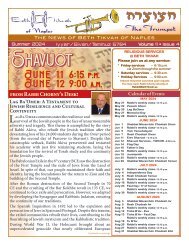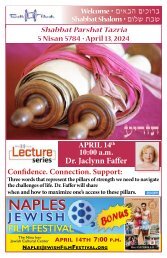Bulletin Ki Teitze
Create successful ePaper yourself
Turn your PDF publications into a flip-book with our unique Google optimized e-Paper software.
Shabbat <strong>Ki</strong> <strong>Teitze</strong><br />
9 Elul 5783 • August 26, 2023<br />
Welcome • ohtcv ohfurc<br />
Shabbat Shalom • ouka ,ca<br />
tm` hf<br />
Join us for Selichot Services<br />
Saturday evening September 9 th - 8:00 p.m.<br />
Monday, September 26 | 7:30 p.m. After Nehila<br />
RSVP by September 21 | Cost $25 p/p
A<br />
We share the sorrow on the passing of<br />
Helene Krivosha k ”z<br />
Beloved wife of the late Hon. Norman Krivosha k ” z<br />
We extend our condolences to her daughters and relatives.<br />
Yahrtzeiten<br />
May her Memory Be for a Blessing • lurc vrfz hvh<br />
Contributions may be sent to Beth Tikvah’s Chesed Fund.<br />
A<br />
120 sg<br />
vfrck oburfz<br />
Aug 26 • 9 Elul Howard Cohen – Father of Gayle Chizzik<br />
Carl Robins – Father of Stacey Baum<br />
Ruth Barber – Wife of Martin Barber<br />
Aug 27 • 10 Elul Joy Mayfield Whisnant – Sister of Jill Valesky<br />
Aug 29 • 12 Elul Esther Lebowitz – Grandmother of Ron Lebowitz<br />
Rose Sherer – Mother of Peter Sherer<br />
Sep 1 • 15 Elul Charles Brinn – Relative of David Siegel<br />
Birthdays<br />
Aug 25<br />
Aug 26<br />
Anniversaries<br />
Fran Alpert<br />
Jacob Poznansky, Stuart Mest<br />
Aug 27 Christine & Bernard Portnoy (45)<br />
Aug 28 Debra & Michael Silow (57)<br />
jna `skuv ouh<br />
Shabbat <strong>Ki</strong>ddush Sponsored by:<br />
cuy kzn<br />
Jill Valesky<br />
In memory of her sister Joy Mayfield Whisnat k”z<br />
Debra & Michael Silow<br />
In honor of their Anniversary<br />
Maven: Steve Chizzik<br />
Assisted by: Rosalee BogoSue & Joe Hammerman, Harvey Jacobson,<br />
Elaine Kamin, Shep & Linda Scheinberg<br />
Sponsor a <strong>Ki</strong>ddush<br />
Contact Arleen Sivakoff: 239.455.8811 • dsivakoff@aol.com
Torah & Haftarah Readings:<br />
Shabbat Re’eh: Deuteronomy 21:10 - 23:7 (Etz Hayim p. 1112)<br />
1. 21:10-14 2. 21:15-17 3. 21:18-21 4. 21:22-22:7<br />
5. 22:8-12 6. 22:13-29 7. 23:1-7 M. 25:17-19 (p. 1135)<br />
Haftarah: Isaiah 54:1-10 (p. 1138)<br />
Torah Commentary<br />
D’var Torah:<br />
Amalek or Me? - Bex Stern-Rosenblatt<br />
Our parashah finishes with three chilling verses: “Remember what Amalek did to you<br />
on the way when you came out of Egypt, how he fell upon you on the way and cut<br />
down all the stragglers, with you famished and exhausted, and he did not fear God.<br />
And it shall be, when the LORD your God grants you respite from all your enemies<br />
around in the land that the LORD your God is about to give you in estate to take hold<br />
of it, you shall wipe out the remembrance of Amalek from under the heavens, you<br />
shall not forget.”<br />
As is the case with much of the Book of Deuteronomy, this is Moses’s retelling of prior<br />
events. The first time we heard about Amalek was back in Exodus. The story is very<br />
different there. We read that Amalek came to do battle with Israel, and we learn of<br />
Moses raising his hands up to ensure success in battle, eventually having his hands<br />
supported with stones. But there is no mention of Amalek coming to take advantage<br />
of the weak among us when we were at our worst. Moreover, God says, “Write this<br />
down as a remembrance in a record, and put it in Joshua’s hearing, that I will surely<br />
wipe out the name of Amalek from under the heavens.” In Exodus it is God who will<br />
wipe out God’s name, rather than us, the Israelites, as it is in Deuteronomy.<br />
Biblical scholar Diana Lipton has a fascinating read on why Deuteronomy tells a story<br />
of Amalek as aggressor and Israel as responsible for dealing with Amalek whereas<br />
Exodus presents Amalek as having done nothing exceptionally wrong and holds God<br />
as responsible for wiping out Amalek. By reading the story told in Deuteronomy 25<br />
about Amalek in context with the rest of Deuteronomy 25, Lipton adds a new layer<br />
of meaning. The story becomes a narrative to reinforce the laws mentioned before it<br />
in the parashah, much as in Deuteronomy Moses retells the story of Miriam getting<br />
skin disease when he mentions the laws around skin disease. They become examples,<br />
almost parables, to help us understand the importance of observing the law and how<br />
to do so.<br />
The law cited at length before the story of Amalek is about protecting the weakest<br />
members of society. The law of levirate marriage is intended to protect the widow<br />
and the deceased among the Israelites. Of course, these are the very people that the<br />
Deuteronomy presents Amalek as attacking - Amalek fell upon us and attacked the<br />
stragglers, the weak, those unable to defend themselves. This becomes his great crime<br />
in the Deuteronomic retelling.<br />
Moreover, with levirate marriage, we read that if a husband dies, leaving his wife without<br />
a son, his brother becomes responsible for fathering a child, “in the name of his dead
other, that his name be not wiped out from Israel.” The words used here are identical<br />
to the words found in the story of Amalek in Exodus and echoed in Deuteronomy. In<br />
the case of levirate marriage, the point is to prevent a name from being wiped out. In<br />
the case of Amalek, the point is to ensure that the name and the memory are wiped<br />
out. But, the law of levirate marriage continues, providing instructions for what to<br />
do when a kinsman refuses to do his duty, refuses to prevent the name and memory<br />
of his brother from being wiped out, refuses to protect the widow. Lipton posits that<br />
Deuteronomy is going so far as to imply that a kinsman who would refuse to fulfill<br />
this duty is acting just as the Amalekites did, attacking us at our weakest. The desire to<br />
wipe out the name and memory of Amalek becomes transformed into the desire to<br />
wipe out the desire inherent in ourselves to act this way, to take advantage of the weak<br />
among us rather than supporting them.<br />
Deuteronomy also changes who is responsible for accomplishing this task. In Exodus,<br />
God will wipe out the name of Amalek. In Deuteronomy, we will. Deuteronomy takes<br />
the difficult, seemingly genocidal story of Amalek and transforms it into a parable<br />
of Israelites communal responsibility. It becomes a moralistic tale of why you’d best<br />
support the widow, lest someone accuse you of behaving like Amalek.<br />
5784 – 2023-2024<br />
Selichot with Cantor Brody<br />
Saturday, September 9 th – 8:00 p.m.<br />
Rosh Hashanah<br />
Friday, September 15 th – 6:15 p.m.<br />
First Day:Saturday, September 16 th – 9:00 a.m.<br />
Second Day: Sunday, September 17 th – 9:00 a.m.<br />
Yom <strong>Ki</strong>ppur<br />
Kol Nidre: Sunday, September 24 th – 6:00 p.m.<br />
Monday, September 25 th – 9:00 a.m.<br />
Yizkor – 11:30 a.m.<br />
Please send your High Holiday Forms ASAP<br />
Don’t forget to indicate how many people will be attending services!<br />
Beth Tikvah of Naples<br />
1459 Pine Ridge Road<br />
Naples, FL 34109<br />
239 434-1818<br />
Visit us online at<br />
bethtikvahnaples.org<br />
or scan the QR code<br />
to go there directly


















